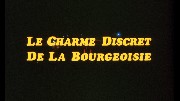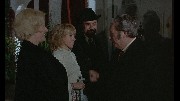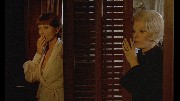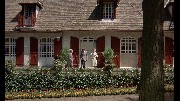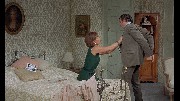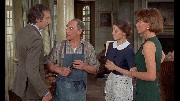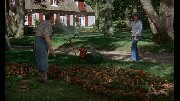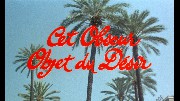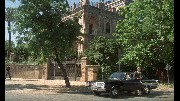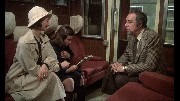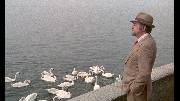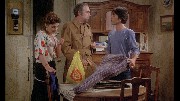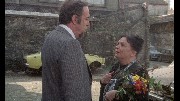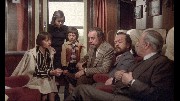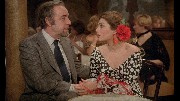Three Films by Luis Buñuel: Le charme discret de la bourgeoisie / The Discreet Charm of the Bourgeoisie (1972), Le fantôme de la liberté / The Phantom of Liberty (1974), Cet obscur objet du désir / That Obscure Object of Desire (1977) 3 x Blu-Ray Criterion Collection
on October 7th, 2021 at 22:25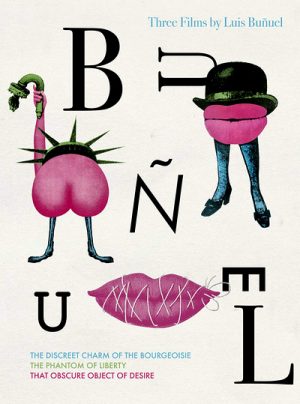
Throughout his life, Luis Buñuel disdained reductionist interpretations of the “meaning” of his work, asserting more often than not that there was no meaning, that he included in his films only what amused him. Yet it seems difficult not to see much of what he did as rooted in a lifelong reaction to his early experiences as a child in Aragon, a region of Spain which he stated had remained Medieval until World War One, and to his education by Jesuits. A deeply embedded social order and the formalized rituals and meanings of the Catholic Church remained major elements of his work throughout five decades of filmmaking, always expressed through his resistance to being contained by those social and religious restrictions.
Driven from Spain by Fascists and from New York by commie hunters, he escaped to university in Madrid, befriending the painter Salvador Dali and the poet Federico Garcia Lorca, that ingrained resistance came to include the Modernism which itself was a reaction rigid social and religious rules. With his friends, Buñuel embraced Surrealism, itself a revolt against the constraints of rationalism. Already drawn towards cinema, a viewing of Fritz Lang’s Der müde Tod (1921) convinced him that movies were the way to express himself.

As Luis Buñuel neared the end of his life, he swore each time he made a film that it would be his last, not because he wanted to quit, but because he feared dying before completion. Known as Don Luis to his crews and cast members, he reportedly made his sets welcoming, joyous environments, even as he grappled with his own mortality. Death factors into the plots of each of the films included in this new Criterion box set, but Buñuel’s wry comedic sensibilities ensure that the films never seem morbid, instead seemingly implying that life is but a farce.
Of the three films, the first two are original works, while That Obscure Object of Desire is an adaptation of a novel from 1898 that had been filmed many times before, most notably in a 1929 version that had a major impact on young Buñuel, appearing in the same year as his debut directorial effort. In fact, one of Criterion’s best bonus features here shows key scenes from that 1929 silent film, La femme el le pantin, making it easy to compare just how strikingly similar Buñuel staged those scenes in his own version.
The Discreet Charm of the Bourgeoisie (1972) starts with a simple concept of a group of friends meeting to dine together, but then spins into a cascading series of misadventures and side quests that occasionally totally disregard that idea as Buñuel pursues his artistic muse wherever it leads. At one point, the diners seem to have found an abandoned restaurant they can have to themselves for their meal, only to learn that a funeral is happening in the room right next to them. Odd things happen throughout the film, but they’re surrounded by the banality of the friends going through the expected motions related to securing a meal, with Buñuel seemingly thumbing his nose at societal norms such as when he literally pulls the curtains back on the diners seated at their table to reveal that they’re on stage in front of a live audience.
The Phantom of Liberty (1974) disregards expected structure even more, eschewing any overarching plot in favor of a loose collection of 12 seemingly unrelated vignettes with only certain characters moving throughout them to tie everything together. It’s the funniest film of the set, as well as the most confounding. It starts with a firing squad set centuries in the past, then moves on to the present day as a creepy man approaches a couple of young children in a park and offers them a collection of photographs, leading to an uncomfortable situation when they arrive home and show the pictures to their horrified parents, with the parents throwing a fit about each of the seemingly more obscene images that are revealed to be totally innocuous shots of nature and architecture. Later, there’s an extended sequence where parents are called to their daughter’s school because she has disappeared, leading to a trip to the police station and a desperate missing persons search, all while the little girl is right by her parents’ side, with the police captain interviewing her as he fills out the missing persons form. It’s a wacky, subversive film, clearly showing that Buñuel still had the chops of a young rebel even as he entered his mid-'70s.
That Obscure Object of Desire (1977) returns to classic plot structure, with Buñuel’s adaptation mostly coloring within the lines aside from starting and ending with literal bangs. His most subversive act here is the dual casting of Carole Bouquet (For Your Eyes Only) and Angela Molina as the principal female character, switching them out at random, even mid-scene. They aren’t physically or culturally similar, he just got a kick out of the idea and went for it, renewing his passion for his final film after he initially shut it down in the wake of his displeasure with original casting choice Maria Schneider (Last Tango in Paris). The story is about an old man who becomes infatuated with a young woman, following her around like a puppy even as she initially rebuffs his advances. The plot isn’t all that interesting, but Buñuel’s execution is exceptional, exploring the pathology of desire as he delivers a cohesive, moving adapted story as he did to similar fantastic effect with Belle de Jour. It’s a fine coda to his monumental career and Criterion’s excellent box set.
3xBD50 | 1080p AVC | 01:41:56, 01:44:13, 01:44:22 | 136 Gb + 3% rec
Language: French
Subtitles: English
Genre: Comedy, Drama
Extras:
The Discreet Charm of the Bourgeoisie
• Speaking of Bunuel - this archival documentary examines the life and legacy of Luis Bunuel while exploring many of the director's personal photos, documents, and home movies. Included in it are interviews with Carlos Saura (El Dorado), Jean-Claude Carriere, Michel Piccoli, and Carole Bouquet, amongst others. The documentary was produced by Jose Luis Lopez-Linares and Javier Rioyo in 2000. In Spanish and French, with optional English subtitles. (100 min, 1080i).
• The Castaway of Providence Street - in the late 1960s and early '70s, director Arturo Ripstein and editor Rafael Castanedo routinely visited the home of Luis Bunuel in Mexico City and filmed their time together. The Castaway of Providence Street gathers the footage they shot. The original version of the film, which included excerpts from Bunuel's own work, was reedited by Castanedo in the early 2000s, and the reconstructed version is presented here. In Spanish, with printed English subtitles. (24 min, 1080i).
• Once Upon a Time "The Discreet Charm of the Bourgeoisie" - presented here is an archival episode of the documentary series Once Upon a Time which examines the production history of The Discreet Charm of the Bourgeoisie. The episode was broadcast in 2011. In French, with optional English subtitles. (52 min, 1080i).
• Making "The Discreet Charm of the Bourgeoisie" - presented here is an archival episode of the French program Pour le cinema which features raw footage from the shooting of The Discreet Charm of the Bourgeoisie as well as clips from interviews with Luis Bunuel and various cast members. The episode was broadcast in 1972. In French, with optional English subtitles. (14 min, 1080i).
• Trailer - original French trailer for The Discreet Charm of the Bourgeoisie. In French, with optional English subtitles. (3 min, 1080i).
The Phantom of Liberty
• Jean-Claude Carriere - in this archival video interview, writer Jean-Claude Carriere explains how the original concept for The Phantom of Liberty came to exist and addresses some of the key themes that define the film. The interview was conducted for Criterion in 2000. In English, not subtitled. (5 min, 1080i).
• Peter William Evans - in this archival program, film scholar Peter William Evans deconstructs The Phantom of Liberty and addresses its style. The program was produced in 2017. In English, not subtitled. (20 min, 1080p).
• Michel Piccoli and Jean-Claude Brialy - presented here is an archival episode of the French television series Pour le cinema in which Michel Piccoli and Jean-Claude Brialy discuss Luis Bunuel's working methods. In French, with optional English subtitles. (5 min, 1080i).
• Jean-Claude Brialy - presented here is an archival episode of the French television program Le dernier des chiq in which Jean-Claude Brialy shares a few anecdotes about his collaborations with Luis Bunuel. The episode was broadcast in 1974. In French, with optional English subtitles. (7 min, 1080i).
• The Producers: "Serge Silberman" - this archival documentary focuses on the life and legacy of producer Serge Silberman, who collaborated with Luis Bunuel on The Phantom of Liberty, That Obscure Object of Desire, and The Discreet Charm of the Bourgeoisie. The documentary was produced in 1985. In French, with optional English subtitles. (31 min, 1080i).
• Trailer - vintage original trailer for The Phantom of Liberty. In French, with printed English subtitles. (4 min, 1080i).
That Obscure Object of Desire
• Optional English DUB
• Lady Doubles - in this archival program, Carole Bouquet and Angela Molina recall their first impressions of Luis Buñuel and discuss their contributions to That Obscure Object of Desire. The two actresses, who became good friends during the production process, also explain how their careers changed after the film was released. The interview was conducted exclusively for Studio Canal in 2012. In French and Spanish, with optional English subtitles. (38 min, 1080p).
• La Femme at le Pantin/The Woman and the Puppet - Pierre Louys' 1898 novel The Woman the Puppet has been adapted for the screen at least six times. Jacques de Baroncelli's 1929 film apparently influenced Luis Bunuel when he began working on his adaptation of the novel That Obscure Object of Desire. Presented here are three scenes from Baroncelli's film. With music, French intertitles, and optional English subtitles.
1. Conchita Dances. (3 min, 1080i).
2. Humiliation. (5 min, 1080i).
3. Fight. (4 min, 1080i).
• Jean-Claude Carriere - in this long video interview, writer Jean-Claude Carriere discusses his professional relationship with Luis Bunuel and his working methods, as well as his contribution to That Obscure Object of Desire and interaction with various cast members. (Carriere worked with Buñuel on many of his acclaimed films, including Belle de jour, The Discreet Charm of the Bourgeoisie, and The Phantom of Liberty). The interview was conducted exclusively for Criterion in 2000. In English. (19 min, 1080i).
• Portrait of an Impatient Filmmaker - in this archival program, assistant director Pierre Lary and cinematographer Edmond Richard recall why nd how Luis Buñuel decided to replace Maria Schneider (Last Tango in Paris) with Carole Bouquet and Angela Molina after shooting of That Obscure Object of Desire had already begun. The program was produced in 2012. In French, with optional English subtitles. (17 min, 1080i).
• Remembering Bunuel - presented here is a segment of the French program Allons au cinema in which Jean-Claude Carriere, actors Fernando Ray, Michel Piccoli, Muni, and Julien Bertheau, critic Robert Benayoun, producers Serge Silberman and Claude Jaeger, and publicist Georges Cravenne discuss their professional relationships and work with Luis Bunuel. The segment was filmed in 1977. In French, with optional English subtitles. (32 min, 1080i).
• Carriere, Rey, and Silberman - presented here is an episode of the French television program Le Monde du cinema featuring Jean-Claude Carriere, Fernando Rey, and Serge Silberman. The bulk of the information that is shared in it addresses the conception of That Obscure Object of Desire and the Luis Bunuel's directing methods. The episode was broadcast in 1977. In French, with optional English subtitles. (16 min, 1080i).
• Trailer - an original vintage French trailer for That Obscure Object of Desire. In French, with printed English subtitles. (2 min, 1080i).
Bunuel.1972.Discreet.Charm.Bourgeoisie.CC.BluRay.L.part01.rar
Bunuel.1972.Discreet.Charm.Bourgeoisie.CC.BluRay.L.part02.rar
Bunuel.1972.Discreet.Charm.Bourgeoisie.CC.BluRay.L.part03.rar
Bunuel.1972.Discreet.Charm.Bourgeoisie.CC.BluRay.L.part04.rar
Bunuel.1972.Discreet.Charm.Bourgeoisie.CC.BluRay.L.part05.rar
Bunuel.1972.Discreet.Charm.Bourgeoisie.CC.BluRay.L.part06.rar
Bunuel.1972.Discreet.Charm.Bourgeoisie.CC.BluRay.L.part07.rar
Bunuel.1972.Discreet.Charm.Bourgeoisie.CC.BluRay.L.part08.rar
Bunuel.1972.Discreet.Charm.Bourgeoisie.CC.BluRay.L.part09.rar
Bunuel.1972.Discreet.Charm.Bourgeoisie.CC.BluRay.L.part10.rar
Bunuel.1972.Discreet.Charm.Bourgeoisie.CC.BluRay.L.part11.rar
Bunuel.1974.Phantom.Liberty.CC.BluRay.L.part01.rar
Bunuel.1974.Phantom.Liberty.CC.BluRay.L.part02.rar
Bunuel.1974.Phantom.Liberty.CC.BluRay.L.part03.rar
Bunuel.1974.Phantom.Liberty.CC.BluRay.L.part04.rar
Bunuel.1974.Phantom.Liberty.CC.BluRay.L.part05.rar
Bunuel.1974.Phantom.Liberty.CC.BluRay.L.part06.rar
Bunuel.1974.Phantom.Liberty.CC.BluRay.L.part07.rar
Bunuel.1974.Phantom.Liberty.CC.BluRay.L.part08.rar
Bunuel.1974.Phantom.Liberty.CC.BluRay.L.part09.rar
Bunuel.1974.Phantom.Liberty.CC.BluRay.L.part10.rar
Bunuel.1977.That.Obscure.Object.Desire.CC.BluRay.L.part01.rar
Bunuel.1977.That.Obscure.Object.Desire.CC.BluRay.L.part02.rar
Bunuel.1977.That.Obscure.Object.Desire.CC.BluRay.L.part03.rar
Bunuel.1977.That.Obscure.Object.Desire.CC.BluRay.L.part04.rar
Bunuel.1977.That.Obscure.Object.Desire.CC.BluRay.L.part05.rar
Bunuel.1977.That.Obscure.Object.Desire.CC.BluRay.L.part06.rar
Bunuel.1977.That.Obscure.Object.Desire.CC.BluRay.L.part07.rar
Bunuel.1977.That.Obscure.Object.Desire.CC.BluRay.L.part08.rar
Bunuel.1977.That.Obscure.Object.Desire.CC.BluRay.L.part09.rar
Bunuel.1977.That.Obscure.Object.Desire.CC.BluRay.L.part10.rar
Bunuel.1977.That.Obscure.Object.Desire.CC.BluRay.L.part11.rar
